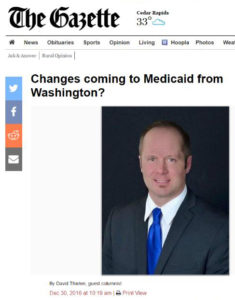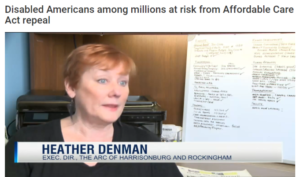Chapters of The Arc Are Getting Media Coverage on the ACA and Medicaid
Members of Congress are constantly seeking ways to know what’s going on back home and what their constituents care about. One way their offices do this is by monitoring their local and state newspapers every day. When constituents get published or quoted, members of Congress and their staff pay attention.
Several chapters of The Arc have gotten such well-deserved attention in the last several weeks. They have clearly and persuasively articulated the concerns of thousands of people with intellectual and developmental disabilities (IDD) in their communities regarding the Affordable Care Act (ACA) and the Medicaid program.
 David Thielen, CEO of The Arc of East Central Iowa, had a guest column printed in the Iowa Gazette at the end of December regarding the effects of block granting Medicaid. He made the point that there are only three main levers when costs are shifted to cash-strapped states under a block grant – reducing eligibility, limiting services and supports, and cutting reimbursement to providers. Three weeks later, he followed up with another guest column published in the Cedar Rapids Gazette explaining the tangible benefits of the ACA to individuals with IDD. These include improvements to long-term supports and services, tax credits to improve affordability of health insurance, banning discrimination based on pre-existing condition, ending annual and lifetime caps, and requiring plans to provide a comprehensive set of benefits including rehabilitative and habilitative services and devices.
David Thielen, CEO of The Arc of East Central Iowa, had a guest column printed in the Iowa Gazette at the end of December regarding the effects of block granting Medicaid. He made the point that there are only three main levers when costs are shifted to cash-strapped states under a block grant – reducing eligibility, limiting services and supports, and cutting reimbursement to providers. Three weeks later, he followed up with another guest column published in the Cedar Rapids Gazette explaining the tangible benefits of the ACA to individuals with IDD. These include improvements to long-term supports and services, tax credits to improve affordability of health insurance, banning discrimination based on pre-existing condition, ending annual and lifetime caps, and requiring plans to provide a comprehensive set of benefits including rehabilitative and habilitative services and devices.
Robert Hage, President of The Arc of New Jersey wrote a letter to the editor on January 15 that appeared in five local news outlets. He discussed the increased access to private insurance and Medicaid expansion provided by the ACA, and noted that “repeal may make a good soundbite – but what Americans with IDD need now is more than talk – they need action that keeps the promise of the ACA.”
Three other chapters were interviewed in news stories in January, including a television interview. Nancy Murray of The Arc of Greater Pittsburg at ACHIEVA was quoted in the Pittsburgh Post-Gazette regarding Medicaid block grants, “Right now, [this] is the No. 1 concern among disability advocates. We are scared to death.” In an article in the Wisconsin State Journal, Lisa Pugh of The Arc Wisconsin reinforced the few, stark options that states would face under a block grant, “Any form of a reduced funding structure from the federal government means likely one of three things: cuts to programs, cuts to benefits, or elimination of certain populations of people in Medicaid.”
 Heather Denman, Executive Director of The Arc of Harrison and Rockingham, appeared in a segment on Virginia’s WHSV 3 to highlighted the ACA’s provisions on ending annual and lifetime caps on health insurance coverage, eliminating pre-existing condition discrimination, and providing funding for services outside of institutions. “The biggest piece is just taking something away and not having anything that is there to replace it and worrying about people who have preexisting conditions,” she stated.
Heather Denman, Executive Director of The Arc of Harrison and Rockingham, appeared in a segment on Virginia’s WHSV 3 to highlighted the ACA’s provisions on ending annual and lifetime caps on health insurance coverage, eliminating pre-existing condition discrimination, and providing funding for services outside of institutions. “The biggest piece is just taking something away and not having anything that is there to replace it and worrying about people who have preexisting conditions,” she stated.
The Arc is proud of its network of over 660 chapters across the country who work hard everyday advocating for people with IDD and their families. We are pleased to see more and more in the press as a result of this as informed and passionate spokespersons.








